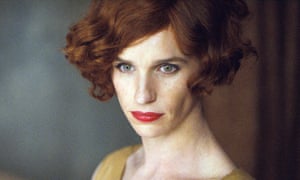 |
| The Danish Girl actors Eddie Redmayne, left and Alicia Vikander, alongside British director Tom Hooper. Photograph: CLAUDIO ONORATI |
Danish Girl director Tom Hooper: film industry has 'problem' with transgender actors
Director of film starring Eddie Redmayne, about Danish transgender pioneer Lili Elbe, says that ‘access to roles’ is key to progressThe film industry has a “problem” with transgender actors, with many unable to secure roles despite a “huge pool of talent”, according to film director Tom Hooper, whose latest film The Danish Girl – starring Eddie Redmayne as a pioneering recipient of gender-reassignment surgery – receives its world premiere at the Venice film festival.
Hooper said: “Access for trans actors to both trans and cisgender roles is utterly key. In the industry at the moment there is a problem: there is a huge pool of talent of trans actors, and access to parts is limited. I would champion any shift where the industry embraces trans actors. and celebrates trans film-makers.”Without explicitly acknowledging the controversy surrounding the casting of Redmayne, a non-trans actor, in the lead role of Einar Wegener – the real-life Danish painter who underwent a series of operations in the early 1930s to become Lili Elbe – Hooper said: “There’s something in Eddie that is drawn to the feminine; he’s played women before, most notably Viola in Twelfth Night. In our film, Lili is presented as a man for two-thirds of the movie, and her transition happens quite late on, so that played a part in coming to a decision.” Hooper also said that the production had reached out to the trans acting communities in the cities where they shot – London, Brussels and Copenhagen – and ended up casting “40 or 50 trans supporting artists”. He said: “I’m pleased we achieved what we did, but I’m sure there’s more to do.”
Saying he wanted to “clarify the difference between sexuality and gender”, Redmayne explained that he had embarked on a series of meetings with numerous trans people to better understand the nature of the character he was to play. “I met many people from the trans community, both men and women; I particularly wanted to meet people from different generations, as the film was set at a time when there was no precursor.” He cited a couple from Los Angeles, Cadence Valentine and Trista Hidalgo, as being especially helpful. “The way in which they allowed me to ask them anything, galvanised me. There were two things that stayed with me: Cadence said she would give anything and everything to live a life authentic; and the other was that, while she was transitioning, the question was: how deep was her partner’s pool of empathy.”
Redmayne also said that Hooper had first approached him to play the role in 2008 while they were working on Les Misérables – well before Redmayne’s best acting Oscar win for The Theory of Everything, earlier this year – and had shot the film in the run-up to the release of the latter.
Saying he and Redmayne conceived of the central character as “Eddie playing a woman who was gradually revealed”, and citing the current refugee crisis, Hooper asserted the film is “about inclusion”. “It’s about inclusion made possible by love. In the same way that the refugee crisis on the shores of Europe is an appeal to our hearts, what happens to transgender people when they suffer persecution, is an appeal to our hearts. What I hope is that the film shows is that the only way possible to make inclusion happen is through compassion and love.”
Gerda Wegener / 'The Lady Gaga of the 1920s'
Gerda Weneger / Women
The Danish Girl puts Gerda Wegener’s art on view to the world





No comments:
Post a Comment